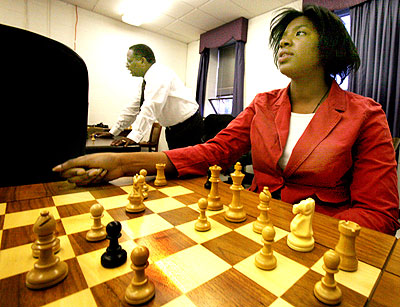|
Recently Hampton University ran a story about Credle's innovative methods which also includes the Japanese sword martial art of Kendo. The article states that one in ten Hampton students know the piece movements prior to the class. As part of the class, students are required to play worldwide on the Internet. Tisa Rabun, a 2004 program graduate, credited her chess lessons for good reviews she gets for problem-solving in her corporate marketing job in Hartford, Conn. "The first thing is, it gets you out of your comfort zone," Rabun said. "Everyone likes games… Competition drives a lot of people."
The article mentions that an Ontario-based consultant uses chess to train corporate employees. Credle plans on experimenting with other games such as Chinese Checkers, Pinochle and Monopoly. This is perhaps a novel way of "lateral thinking" in the business world.
Read Matthew Bowers', "HU dean finds chess, business make a smart match" The Virginian Pilot, 27 February 2007.
|
|
